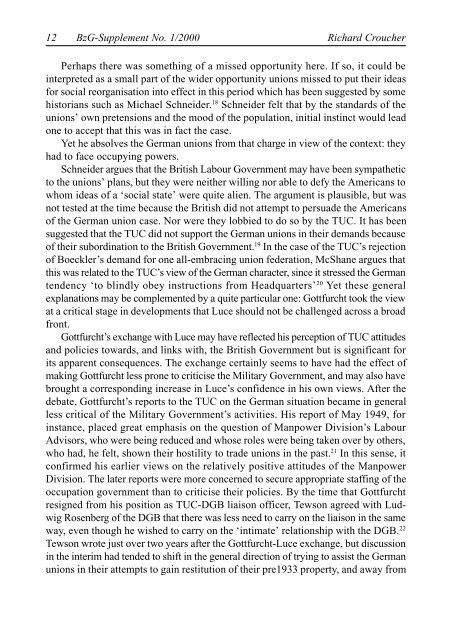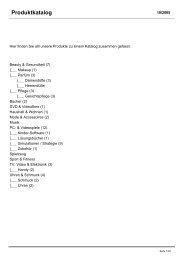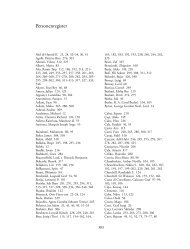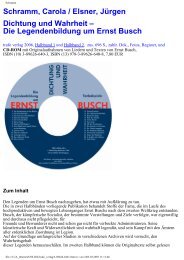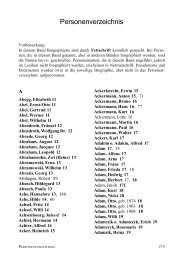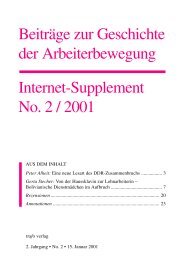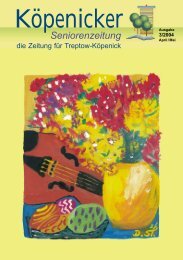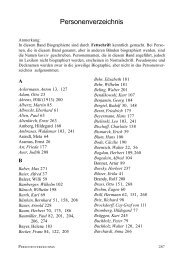Beiträge zur Geschichte der Arbeiterbewegung Internet-Supplement ...
Beiträge zur Geschichte der Arbeiterbewegung Internet-Supplement ...
Beiträge zur Geschichte der Arbeiterbewegung Internet-Supplement ...
Create successful ePaper yourself
Turn your PDF publications into a flip-book with our unique Google optimized e-Paper software.
12 BzG-<strong>Supplement</strong> No. 1/2000<br />
Richard Croucher<br />
Perhaps there was something of a missed opportunity here. If so, it could be<br />
interpreted as a small part of the wi<strong>der</strong> opportunity unions missed to put their ideas<br />
for social reorganisation into effect in this period which has been suggested by some<br />
historians such as Michael Schnei<strong>der</strong>. 18 Schnei<strong>der</strong> felt that by the standards of the<br />
unions’ own pretensions and the mood of the population, initial instinct would lead<br />
one to accept that this was in fact the case.<br />
Yet he absolves the German unions from that charge in view of the context: they<br />
had to face occupying powers.<br />
Schnei<strong>der</strong> argues that the British Labour Government may have been sympathetic<br />
to the unions’ plans, but they were neither willing nor able to defy the Americans to<br />
whom ideas of a ‘social state’ were quite alien. The argument is plausible, but was<br />
not tested at the time because the British did not attempt to persuade the Americans<br />
of the German union case. Nor were they lobbied to do so by the TUC. It has been<br />
suggested that the TUC did not support the German unions in their demands because<br />
of their subordination to the British Government. 19 In the case of the TUC’s rejection<br />
of Boeckler’s demand for one all-embracing union fe<strong>der</strong>ation, McShane argues that<br />
this was related to the TUC’s view of the German character, since it stressed the German<br />
tendency ‘to blindly obey instructions from Headquarters’ 20 Yet these general<br />
explanations may be complemented by a quite particular one: Gottfurcht took the view<br />
at a critical stage in developments that Luce should not be challenged across a broad<br />
front.<br />
Gottfurcht’s exchange with Luce may have reflected his perception of TUC attitudes<br />
and policies towards, and links with, the British Government but is significant for<br />
its apparent consequences. The exchange certainly seems to have had the effect of<br />
making Gottfurcht less prone to criticise the Military Government, and may also have<br />
brought a corresponding increase in Luce’s confidence in his own views. After the<br />
debate, Gottfurcht’s reports to the TUC on the German situation became in general<br />
less critical of the Military Government’s activities. His report of May 1949, for<br />
instance, placed great emphasis on the question of Manpower Division’s Labour<br />
Advisors, who were being reduced and whose roles were being taken over by others,<br />
who had, he felt, shown their hostility to trade unions in the past. 21 In this sense, it<br />
confirmed his earlier views on the relatively positive attitudes of the Manpower<br />
Division. The later reports were more concerned to secure appropriate staffing of the<br />
occupation government than to criticise their policies. By the time that Gottfurcht<br />
resigned from his position as TUC-DGB liaison officer, Tewson agreed with Ludwig<br />
Rosenberg of the DGB that there was less need to carry on the liaison in the same<br />
way, even though he wished to carry on the ‘intimate’ relationship with the DGB. 22<br />
Tewson wrote just over two years after the Gottfurcht-Luce exchange, but discussion<br />
in the interim had tended to shift in the general direction of trying to assist the German<br />
unions in their attempts to gain restitution of their pre1933 property, and away from


